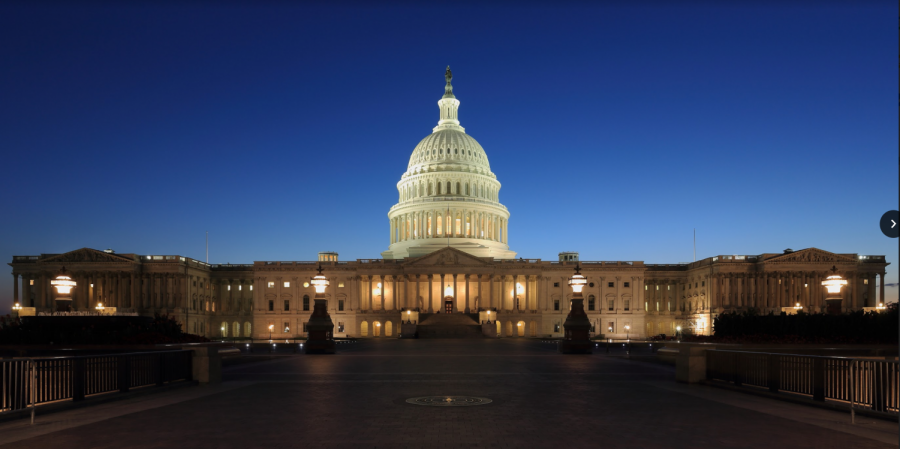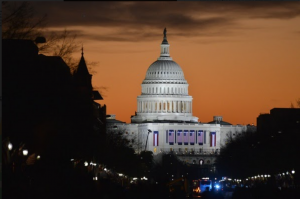What Happens Next?
Breaking down the question of another impeachment.
WHAT’S NEXT? Only a few days after the riots on Capitol Hill on January 6, 2021, the United States Congress is growing increasingly more concerned about what their future will look like, with many different untravelled roads ahead. The question of whether to blame President Donald Trump for inciting the attacks and leading the country down the long road of a possible impeachment or removal looms ahead as the country holds its breath for Inauguration day on January 20, 2021. Whether to reprimand or punish the president or let him be. Whether to pursue another impeachment or just give him a slap on the wrist. All questions our Congress will soon face as the motions for different governmental actions begin and the clock ticks closer to the beginning of a new administration in a few short days. Read the full story at the link in our bio.
January 12, 2021
It has been six days since the storming of the Capitol rocked the nation on January 6, 2021.
And it’s been a rough couple of days, to say the least.
Only a few days after the riots, the entire nation and its government are still trying to recover from an attack that only seems to grow more disturbing as more information is uncovered every day. Reports of Molotov cocktails and pipe bombs, of murky hostage-taking plots and zip-tie carrying assailants, are plastered across major news outlets and social media platforms, terrifying our own citizenry and the world abroad.
The consequences of years of pent-up and neglected political extreme idealisms have blown up in our faces, right at the beginning of a new year supposedly marking a change for the better. With days left before the presidential inauguration and a major shift in power, the world is on edge, watching with bated breath for any more potential fallout before January 20, the inauguration of President-Elect Joe Biden.
The future of our democracy, of the sheer democratic ideal worldwide, was put at risk when those mobs first broke into the Capitol buildings and has remained up in the air for the moment. Leadership is splintering, with our president persecuting his own vice president, a divided Congress split between action and inaction, and with a gathering military force patrolling outside the hallowed halls of our republic, tensions are certainly running high.
How did this happen? A question that seems to be on everyone’s mind and that also seems to be directed straight at one person: the leader of said nation, our President, Mr. Donald J. Trump.
For the moment, I will elect to put aside the question of who is to blame, but the large consensus is currently that, yes, our president is in at least some way responsible for inciting the attack on his Capitol and for not responding appropriately during the said crisis. Many are demanding his resignation or impeachment after this attack exposed the volatile underbelly of the far-right movement Trump himself enjoys feeding, and debates online and in session during Congress have left the country torn and conflicted on if and how the president will be punished for his actions.
The initial fallout was quite sensational, with social media platforms deleting or shuttering his accounts quickly after initial concerning response Tweets by the commander-in-chief, company executives claiming that any further comments risked inciting more violence and conflict.
The scathing commentary on nightly news channels and various statements by different politicians and leaders all reported varying and disputed claims on the next steps after the riot, leading all of us to ask one thing: What’s next for our president?
Well, that’s a bit complicated.
At the moment, the future remains up in the air, as even today on January 12, 2021, Congress is in the midst of debating possible paths forward. For now, let’s begin with the three main potential governmental reactions:
Implementing the 25th Amendment
One of the first scenarios posed by experts and commentators early on during the coverage of the riots, Section 4 of the 25th Amendment basically says that when the vice president (VP) and a majority of the members of the Cabinet deem the president “unable to discharge the powers and duties of his office”, they can then submit a letter to Congress for deliberation. Congress would then have to pass a ⅔ majority to allow the vice president to take over the presidency until the president is able to continue the job.
Even with the growing rift between the president and vice president, VP Mike Pence seems reluctant to enact the 25th, and it is doubtful that he alone will proceed with using it. Speaker of the House Nancy Pelosi and Senate Minority Leader Chuck Schumer have made personal requests to the VP to implement the amendment (which have gone unanswered), and the House of Representatives is currently voting on legislation that could push VP Pence and his Cabinet to use the 25th amendment, an unheard-of move on behalf of Congressional leadership, but one with potentially ground-shaking results.
Impeachment Part 2: Electric Boogaloo
Yes, it’s here. Again. Impeachment.
To be clear, the president has been impeached before, he simply hasn’t been removed, due to the lack of votes from the majority-Republican Senate. On this second occasion, the Democratic-held House is once again introducing articles of impeachment, charging the president with “inciting violence against the government of the United States”. The articles will be debated and voted on in the House as early as January 13, 2021, where they will need a simple majority to pass to the Senate and a ⅔ majority in the Senate for removal.
However, several obstacles stand in the way of a potential second impeachment: first, the fact that the Senate is currently in recess and will not resume their session until January 19, one day before the inauguration of President-elect Joe Biden. While Congress can still impeach an ex-president, critics wonder if such a display during a new administration would start the presidency off on the wrong foot, and many Republicans have expressed their displeasure with any potential impeachment proceedings continuing during the Biden administration.
Secondly, that ⅔ majority is a bit tricky. While Nancy Pelosi and her Democratic colleagues are pushing for impeachment, the Republican side of the aisle is looking quite unsure, and the bar for impeachment in the Senate is a ⅔ majority, meaning an additional 17 Republicans siding with the Democrats. Some more moderate Republicans, like Senator Pat Toomey, have publicly issued statements calling out President Trump on his actions, but still, the bipartisan effort is strained and unpredictable, making it difficult to ensure that the proceedings actually end in removal.
The general consensus among those who wish to impeach is that while also a punitive measure, impeaching President Trump could also prevent him from running for the office of president again in 2024, avoiding a potential restart of the cycle of bipartisan conflict. If the Senate reaches a ⅔ majority and convicts the president, only a simple majority is required to ban him from federal office for the rest of his lifetime.
Censuring the President
One of the most agreed-upon measures across party lines amongst all the bipartisan conflict, however, is censuring. A censure is basically a governmental slap on the wrist. It doesn’t formally do anything, it just expresses Congress’s disapproval for the individual or their actions, and it wouldn’t prevent the President from running again in 2024 or leave any real consequences. A motion to censure is voted on individually in the Senate and House and only needs a simple majority in either one.
Sources:
https://time.com/5928562/impeachment-donald-trump-2024/
https://www.npr.org/2021/01/08/954936268/with-12-days-left-removing-trump-from-office-is-unlikely-if-not-impossible
“https://www.nytimes.com/2021/01/08/us/politics/impeachment-president-trump-capitol.html?ref=oembed”
“https://www.nytimes.com/2021/01/11/us/politics/house-trump-impeachment-vote.html?ref=oembed”








